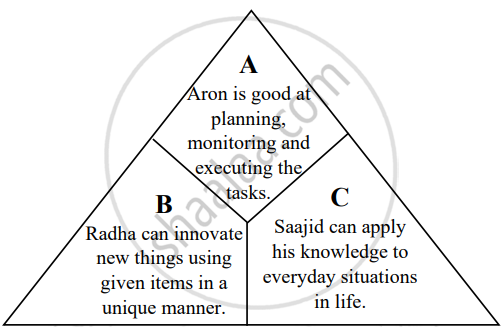Advertisements
Advertisements
Question

- By referring to Sternberg’s theory, identify the components of intelligence displayed by A, B, and C in the figure given above. (3)
- Elaborate on any two characteristics each of A and C. (4)
Solution
- A-Analytical or Componential
B-Experiential or Creative
C-Practical or Contextual - Characteristics:
- A: Analytical or Componential Intelligence:
- Ability to analyse information, recognise patterns, and solve problems systematically.
- Efficient processes like memory, attention, perception, and logical reasoning.
- Ability to identify patterns, draw inferences, and make deductive or inductive conclusions based on available information.
- Ability to make sound decisions and solve problems methodically
- C: Contextual or Practical Intelligence:
- Ability to draw on past experiences to navigate current situations successfully, as displayed by Saajid.
- Ability to use tactic knowledge gained through personal experience rather than formal education. Saajid is able to draw on his own experiences to inform his decision-making and problem-solving processes.
- Street smartness and a clear understanding of social dynamics and interpersonal relationships.
- A: Analytical or Componential Intelligence:
APPEARS IN
RELATED QUESTIONS
“Any intellectual activity involves the independent functioning of three neurological systems”. Explain with reference to PASS model.
How can you differentiate between verbal and performance tests of intelligence?
Read the case given below and answer the questions by choosing the most appropriate option:
This is a story of three students Ruby, Radhika and Shankar who were enrolled in an Undergraduate Psychology Program in a University. Ruby was the admission officer’s dream. She was selected for the program as she had perfect entrance test scores, outstanding grades and excellent letters of recommendation. But when it was time for Ruby to start coming up with ideas of her own, she disappointed her professors.
On the other hand, Radhika did not meet the admission officer’s expectations. She had good grades but low entrance exam scores. However, her letters of recommendation described her as a creative young woman. She could design and implement research work with minimal guidance at college.
Shankar ranked somewhere in between the two students. He was satisfactory on almost every traditional measure of success. But rather than falling somewhere in the middle of his class at college, Shankar proved to be an outstanding student. His strength lay in the ability to not only adapt well to the demands of his new environment but also to modify the environment to suit his needs.
Which of the following statement is NOT TRUE about Radhika’s intelligence?
If a person has the skill of understanding the motives, feelings, and behaviours of other people, he/she is said to have:
Jasleen is high on critical thinking and can manipulate symbols to solve numerical problems. She is also high on the ability to understand one’s own feelings, motives, and desires. Which of the following intelligence is displayed by Jasleen?
- Spatial
- Logical-mathematical
- Interpersonal
- Intrapersonal
Describe the PASS model of intelligence.
Read the case study and answer the question that follow:
|
When Srikanth Bolla was born, neighbours in the village suggested that his parents smother him. It was better than the pain they would have to go through their lifetime, some said. He is a "useless" baby without eyes; being born blind is a sin, others added. Twenty-three years later, Srikanth is standing tall living by his conviction that if the "world looks at me and says, Srikanth, you can do nothing, I look back at the world and say, I can do anything." Srikanth is the Founder and CEO of Hyderabad-based Bollant Industries, an organisation that employs uneducated and challenged employees to manufacture eco-friendly, disposable consumer packaging solutions, which is worth ₹50 crore. He considers himself the luckiest man alive, not because he is now a millionaire but because his uneducated parents, who earned ₹20,000 a year, did not heed any of the 'advice' they received and raised him with love and affection. "They are the richest people I know," says Srikanth. |
We can see that Srikanth has the ability to adopt, shape and select the environment. Identify the theory of intelligence that would best support our understanding of Srikanth's intelligence.
Read the case and answer the questions that follow.
|
'My story about work-related stress' Looking back on my life, I recognize that I have always struggled with anxiety. In relationships, friendships or at work. |
Read the case study and answer the question that follows:
| When Srikanth Bolla was born, neighbours in the village suggested that his parents smother him. It was better than the pain they would have to go through their lifetime, some said. He is a "useless" baby without eyes; being born blind is a sin, others added. Twenty-three years later, Srikanth is standing tall living by his conviction that if the "world looks at me and says, Srikanth, you can do nothing, I look back at the world and say, I can do anything." Srikanth is the Founder and CEO of Hyderabad-based Bollant Industries, an organisation that employs uneducated and challenged employees to manufacture eco-friendly, disposable consumer packaging solutions, which is worth ₹ 50 crore. He considers himself the luckiest man alive, not because he is now a millionaire but because his uneducated parents, who earned ₹ 20,000 a year, did not heed any of the 'advice' they received and raised him with love and affection. "They are the richest people I know," says Srikanth. |
We can see that Srikanth has the ability to adopt, shape and select the environment. Identify the theory of intelligence that would best support our understanding of Srikanth' s intelligence.
Sheetal aims to become a Forest Range Officer as she enjoys being amongst wildlife and wants to protect them from any harm.
- Identify the type of intelligence that Sheetal possesses. Which theory of Intelligence is being indicated here? (2)
- According to the above theory of Intelligence, enumerate any two types of intelligence other than the one referred to above and any two corresponding professions. (2)
